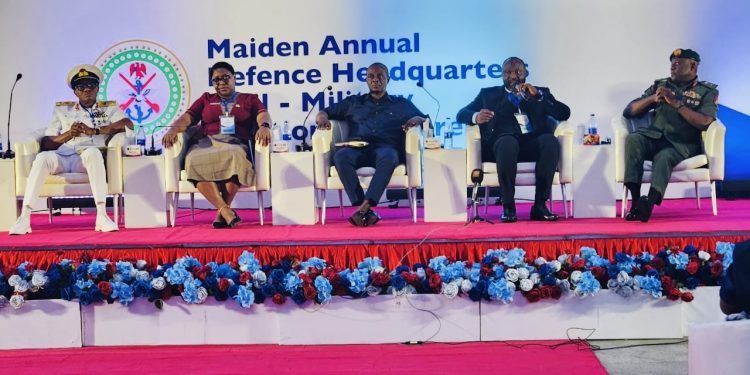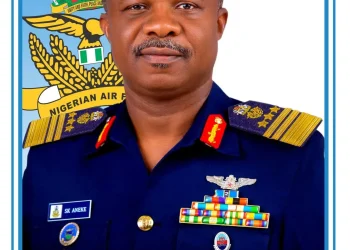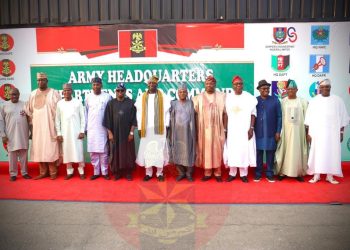By Nkechi Eze
The maiden edition of the Annual Civil-Military Relations Conference, organized by the Defence Headquarters, came to a close in Abuja on Friday 20th June 2025, with renewed calls for strengthened cooperation, grassroots engagement, and a shift towards inclusive, non-kinetic approaches in addressing Nigeria’s security challenges.
The two-day event, which convened senior military officers, policymakers, civil society actors, academics, and media professionals, provided a national platform to reflect on the evolving role of the military in a democratic society and the need to rebuild trust between Nigeria’s Armed Forces and the civilian population.
In her address as Special Guest of Honour, the President of the Defence and Police Officers’ Wives Association (DEPOWA), Mrs. Oghogho Musa, delivered an impassioned message of gratitude and reflection. She thanked God, the event organizers, and all stakeholders whose contributions shaped the success of the conference. Expressing heartfelt appreciation to her husband, the Chief of Defence Staff, General Christopher Musa, she acknowledged his leadership and unwavering support. Mrs. Musa emphasized that civil-military relations must return to the people, noting that understanding and addressing the real concerns of Nigerians, regardless of region or background, is critical to achieving meaningful progress. She called for sustained national conversations rooted in empathy, collaboration, and unity.
Rear Admiral Adeseye Oke Ayobanjo (Rtd) in his presentation on non-kinetic operations by the Armed Forces of Nigeria, underlined the importance of modern warfare strategies that prioritize psychological operations, community trust-building, and strategic communication. He explained that conventional warfare alone cannot resolve today’s complex security threats. Instead, he advocated for a balanced approach combining kinetic (forceful) and non-kinetic strategies that account for the psychological, social, and political dimensions of conflict. Drawing on global examples such as China and Sri Lanka, Adeseye stressed the importance of public perception, de-radicalization, and reintegration programs in post-conflict settings. He called for the institutionalization of non-kinetic tools within the military’s doctrine and urged continued investment in community-focused strategies backed by political support and active civil participation.
Adding to the discourse, retired Major General Rogers Ibe Nicholas echoed the call for more non-kinetic operations in Nigeria’s conflict zones, particularly in the North-Central region. He stated that the root causes of insecurity often stem from the absence of governance, basic infrastructure, and a lack of engagement with local communities. Rather than imposing presumed solutions, he advised that commanders and government officials should consult residents directly to understand their pressing needs such as access to clean water, electricity, or worship centers. He noted that meeting these needs, even with seemingly small interventions, can drastically reduce hostilities.
Major General Nicholas also raised concerns about the imbalance in public discourse on human rights, stating that while civilian rights must be upheld, the rights and sacrifices of soldiers, who are often attacked or killed in the line of duty, are rarely acknowledged. He called for balanced narratives and the inclusion of soldiers’ welfare in national conversations. He also warned about growing threats such as illegal mining and land grabbing, which are driving conflict in certain regions. He urged governments and local communities to take firm action, while also advocating for media access and embedded journalism to ensure transparency and accurate reporting from the field.
Dr. Temilola A. George, a representative of the United States Department of Defense and another key panel discussant, emphasized the need to replace force-centric responses with people-centered strategies. She highlighted trust, not territorial control as the most significant victory in today’s conflicts. Dr. George advocated for a “whole-of-society” approach that brings together government agencies, the private sector, civil society, and local communities to strengthen resilience and deliver inclusive development. She emphasized the importance of working with women, youth, and traditional leaders to build stronger social fabric and more sustainable peace.
In one of the most memorable statements of the conference, Dr. George said, “Non-kinetic operations aren’t soft, they are smart. The soldier who shares a meal with a child wages a silent war against the roots of conflict. In that war, victory means trust, resilience, and peace.”
Delivering the official closing remarks and vote of thanks, Air Vice Marshal Olusola Akinboyewa, Director of Civil-Military Affairs at the Defence Headquarters, described the conference as impactful, timely, and intellectually enriching. He expressed gratitude to the Honourable Minister of Information and National Orientation, Alhaji Mohammed Idris Malagi, whose presence, he said, underscored the importance of communication and transparency in bridging the gap between the military and the public. AVM Akinboyewa extended appreciation to Mrs. Oghogho Musa, military chiefs, and all participants for their roles in making the event a success.
He addressed the perception gap that exists between the military and civilians, noting that while past experiences or misinformation may have shaped public sentiment, the Armed Forces of Nigeria remain a national institution funded by the people and accountable to them. He reiterated that the military is not an isolated or elite force but one that must remain connected to the people it serves.
Akinboyewa highlighted the quality of discourse throughout the conference, applauding the willingness of stakeholders to engage constructively across sectors. He stated that the conference had not only generated actionable resolutions but had also reignited hope for a more collaborative and people-driven approach to national security. He expressed confidence that the outcomes would not remain on paper but would be implemented through the sustained commitment of all stakeholders.
Also featured were presentations from the Defence Civil-Military Relations Unit and their counterparts in the Army, Navy, and Air Force. Each service branch shared progress reports and outlined the evolution of their civil-military relations departments. Their accounts demonstrated how trust-building initiatives, medical outreaches, educational programs, and community partnerships are helping to transform perceptions and foster peace.
As the conference came to an end, participants pledged to carry forward the momentum, working toward institutionalizing the event as an annual national dialogue. The consensus among stakeholders was clear: national security cannot be achieved through force alone, it must be built through trust, empathy, and inclusive partnerships.
On behalf of the Defence Headquarters, Major General Akinboyewa thanked all participants and reaffirmed the Armed Forces’ commitment to national unity, democratic values, and the enduring peace and prosperity of Nigeria.

















